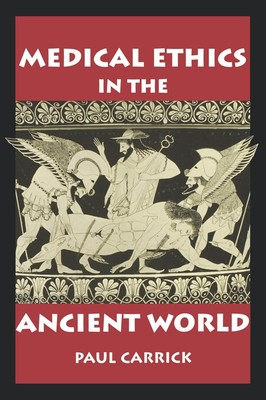
- We will send in 10–14 business days.
- Author: Paul Carrick
- Publisher: Georgetown University Press
- Year: 2001
- ISBN-10: 0878408495
- ISBN-13: 9780878408498
- Format: 15.2 x 22.9 x 1.7 cm, softcover
- Language: English
- SAVE -10% with code: EXTRA
Reviews
Description
In this book Paul Carrick charts the ancient Greek and Roman foundations of Western medical ethics. Surveying 1,500 years of pre-Christian medical moral history, Carrick applies insights from ancient medical ethics to developments in contemporary medicine such as advance directives, gene therapy, physician-assisted suicide, abortion, and surrogate motherhood. He discusses such timeless issues as the social status of the physician; attitudes toward dying and death; and the relationship of medicine to philosophy, religion, and popular mortality. Opinions of a wide range of ancient thinkers are consulted, including physicians, poets, philosophers, and patients. He also explores the puzzling question of Hippocrates' identity, analyzing not only the Hippocratic Oath but also the Father of Medicine's lesser-known works. Accessible to both professionals and to those with little background in medical philosophy or ancient science, Carrick's book demonstrates that in the ancient world, as in our own postmodern age, physicians, philosophers, and patients embraced a diverse array of perspectives on the most fundamental questions of life and death.
EXTRA 10 % discount with code: EXTRA
The promotion ends in 18d.14:56:55
The discount code is valid when purchasing from 10 €. Discounts do not stack.
- Author: Paul Carrick
- Publisher: Georgetown University Press
- Year: 2001
- ISBN-10: 0878408495
- ISBN-13: 9780878408498
- Format: 15.2 x 22.9 x 1.7 cm, softcover
- Language: English English
In this book Paul Carrick charts the ancient Greek and Roman foundations of Western medical ethics. Surveying 1,500 years of pre-Christian medical moral history, Carrick applies insights from ancient medical ethics to developments in contemporary medicine such as advance directives, gene therapy, physician-assisted suicide, abortion, and surrogate motherhood. He discusses such timeless issues as the social status of the physician; attitudes toward dying and death; and the relationship of medicine to philosophy, religion, and popular mortality. Opinions of a wide range of ancient thinkers are consulted, including physicians, poets, philosophers, and patients. He also explores the puzzling question of Hippocrates' identity, analyzing not only the Hippocratic Oath but also the Father of Medicine's lesser-known works. Accessible to both professionals and to those with little background in medical philosophy or ancient science, Carrick's book demonstrates that in the ancient world, as in our own postmodern age, physicians, philosophers, and patients embraced a diverse array of perspectives on the most fundamental questions of life and death.


Reviews